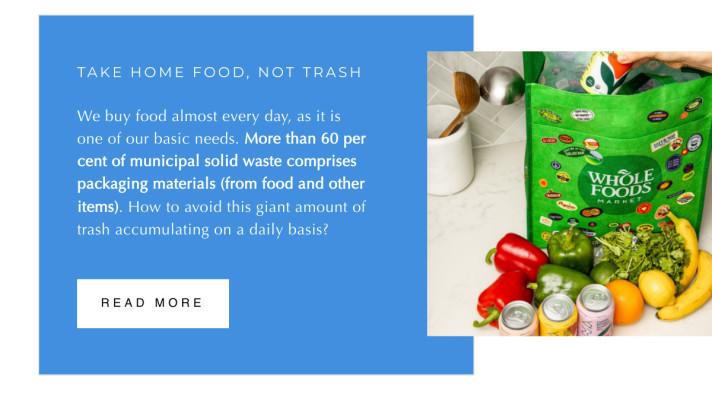Take Home Food, not Trash
We buy food almost every day, as it is one of our basic needs. With the development of global retail, we have a bigger choice of products from all over the world with expanded shelf life in our supermarkets. But at the same time, the amount of waste generated has increased, as producers have to package food more to keep it fresh for longer. More than 60 per cent of municipal solid waste comprises packaging materials (from food and other items).
At first glance it may seem you have little option, as plastic is everywhere you look. But by following our tips, you can easily produce less waste while doing your grocery shopping.

Buy What You Need
As you're probably well aware by now, reducing the number of items we buy is our main aim when going zero waste. Here's our advice on how you can apply this to your groceries:

No Packaging, Please
While most food is packaged, there are still opportunities to shop sustainably. You can buy fruit and vegetables, cereals, pasta, eggs, coffee, tea, spices, and even cheese, meat and ready-made food that produces no waste. In some countries it is easy to find these items packaging-free in supermarkets, though sometimes you'll need to visit markets or zero waste shops. But once you've found them, how can you weigh and transport all these things back home? Use your own packaging:

What to Do if You Can't Avoid Packaging
At the farmers markets and small local shops, you have more chance of getting food without packaging than at chain stores. But sometimes we are limited in our grocery shopping options because of the modern pace of life. If you have no other option than buying packaged food, take advantage of one statement of wisdom: Waste is not waste until we waste it.
Here our old friend the waste hierarchy comes in again, you know what we're talking about - reduce, reuse, recycle! As a first priority, buy food in packages that you can (and will) reuse further, such as jars and resealable containers. Next step, check what is recyclable in your area and choose food with packaging made from these materials. It could be metal, glass, paper, PET and HDPE bottles or other materials depending on your city. Find more recycling tips in our previous article.
One thing to bear in mind is that food can sometimes have a second, hidden layer of packaging. As a rule, you can find this indicated on the outer packaging (for example on tea, rice, biscuits, etc.). If there are no clues about hidden packaging, give it a shake or a squeeze - the rustling sound will hint if there's a plastic bag inside.

If the Packaging Cannot Be Recycled
We believe you can find anything without packaging or in eco-friendly packaging if you try hard enough. But the world isn't ideal, and zero waste isn't yet the norm. So, if the previous pieces of advice aren't possible for you, you can try to at least buy big units. One large piece of packaging requires less material than several small ones. So one 1.5 l water bottle is better than six 250 ml bottles, one 2 kg bag of flour is better than two 1 kg bags, and so on.
Apply this tip for products that can be stored for a long time and be careful to store them in the right environment. Because if the food spoils, your good intentions will have all gone to waste!

General Tips for Sustainable Shopping
To finish, here are some general tips to avoid excessive waste when going food shopping:

We'd be thrilled to know which of these tips you have already tried out. Share your sustainable shopping experience on social media and don't forget to tag us!
?
Images credit - www.freepik.com.
Zdroj: https://www.worldcleanupday.org/
